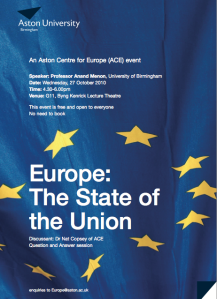The meeting of the Heads of State and Government in the European Council in Brussels on 8/9 December 2011 marks nothing short of a caesura in the UK’s almost thirty-nine years of membership of the European Union. There are five principal points to note from this:
1. Regardless of the content of the new intergovernmental treaty, the fact that the somewhere between 23 and 26 countries are likely to sign up for this, with potentially only the UK on the sidelines, represents a spectacular failure of British diplomacy. Hitherto, the UK’s underlying approach to European negotiations had always been predicated on the idea of being in the room when the decisions are taken, even if Britain did not always formally participate in the outcomes of these decisions. And when it did oppose proposals, the British government has generally managed to ensure that it is not the only country doing so. Of course, one could argue that this ‘having your cake and eating it‘ tactic could not continue indefinitely; nonetheless, it is David Cameron, not John Major or even Margaret Thatcher, who will go down in history as the first UK Prime Minister to have failed on this account.
2. In truth, there was little chance of Cameron ever agreeing to the proposed new treaty. For one thing, the City is not only a major contributor to the British economy, but also to the Conservative Party (see the FT’s telling blog on this issue) – given this, it would have been astonishing had he agreed to more regulation of financial services. Second, had he signed up to a treaty it would have meant, at best, a drawn out and tortuous parliamentary ratification process (with Eurosceptic backbenchers literally queuing up to demand repatriation of powers) or at worst a full-blown referendum on Britain’s membership of the EU, with terminal consequences for the Conservative Lib Dem coalition. It’s a moot point whether this prompted a deliberate strategy by Cameron to deploy his veto – Charles Grant of the CER certainly seems to think so.
3. One might therefore even be tempted to show understanding for the Prime Minister’s decision – if only it had not come at such a terrible price for the UK. Although the UK has de facto been outside key EU policies (the Euro, Schengen, Justice and Home Affairs / immigration) for many years now, that exclusion has now been institutionalised. Moreover – and this is perhaps the central point of this posting – it is an illusion to suppose that Britain will still have a full say in matters concerning the Single Market. The new treaty will spell much closer coordination and integration for participating member-states and to expect that this will not have implications for the forming of common positions in other policy areas, such as CAP and the Single Market, is frankly rather naive. It is not, as the Prime Minister suggested in his post-summit press conference, a question of whether EU officials will or will not support the work of the new treaty: in the EU, most decisions are prepared informally in the corridors between plenary meetings. Yet if the UK from the outset is not in the corridor, it cannot be part of that decision-making process. The very real likelihood over time, therefore, is that the UK will increasingly be presented with a series of faits accomplis by the other member-states, which it will have to accept, or face being outvoted on.
4. The decision to wield Britain’s veto formally has also cost an enormous amount of political capital. Already, patience with Britain has been wearing thin, but it has now erupted into open anger. The situation was not helped by some very poor preparatory work by the British government – in particular, David Cameron made no real attempt to win allies for his position, preferring instead to ‘go to Brussels’ and fight it out, mano y mano, with the other leaders. The BBC has an interesting collation of responses to Britain from around the EU, but the palpable anger in the comments by the Lithuanian President, Dalia Grybauskaitė, in her comments to German television gives the best impression of how isolated the UK now is.
The summit, therefore, has left Britain more on the margins of the European Union than at any previous time in its history. Its outcome moreover now poses questions of a fundamental nature about the UK’s future role and position in the EU, which, ultimately, may even lead to referendum on the UK’s membership itself. That may cheer the hearts of the Conservative Eurosceptic Right, but it is scarcely a credible position for a relatively small (and heavily indebted) trading nation on the northwestern fringes of Europe to take.



